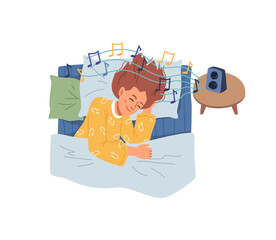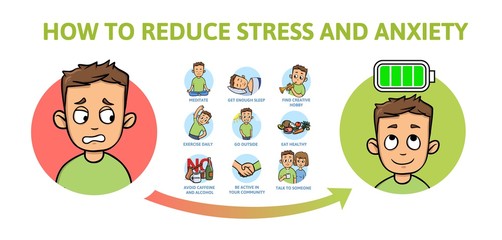Did you know that some sounds can help you fall asleep faster and get more restful sleep? The right sounds can drown out other distracting noises or help calm your mind and body as you fall asleep, allowing you to get the rest you need to wake up refreshed and ready to face the day. Here are seven healthy sleep sounds to help you fall asleep faster.
Better Sleeping Position
Sleeping on your back can help you breathe better and fall asleep faster. The National Sleep Foundation suggests sleeping on your back with one pillow under your head and another supporting your neck and spine. Although not all experts agree, some people also say that sleeping on your side is beneficial if you have a snoring spouse in bed with you. If side sleeping is more comfortable for you, place one pillow underneath each arm, like two wings of an airplane or two arms of a letter C position. Another good way to get a good night’s sleep is by wearing earplugs when you sleep.
These small devices fit inside your ears and muffle sounds so that you won’t be awakened by the noise. This will allow you to enjoy healthy sleep sounds as well as uninterrupted rest throughout the night. An excellent alternative for those who are too embarrassed to wear earplugs is white noise machines. Similar to how a television drowns out other noises, these machines create low-level ambient sounds that block out distracting noises while you sleep. White noise machines typically offer a variety of options, such as rainstorms, ocean waves, and crackling fireplaces. There are even some models designed specifically for babies and young children. Healthy sleep sounds can make it easier to fall asleep faster, stay asleep longer and wake up feeling refreshed.
White Noise
Try listening to some low-volume white noise before bed. The sounds might not make it easier for you to fall asleep, but they can help you stay asleep since white noise helps block out any other noises that could wake you up in the middle of the night. Many people like listening to air conditioning units or fans. Some even say that running a vacuum cleaner in another room (set on low) will do it, too.
Source: https://www.youtube.com/channel/UCTSsy9bWTUbWqs7umPyL_uQ
Anything around 50 decibels is good—that’s about as loud as a refrigerator humming. However, if you are sensitive to noise and don’t want to use an external device, try making your own ambient sound by blowing gently into your cupped hand; release your hand and listen to how long it takes for the sound to fade away completely. Then repeat until you find a volume level that feels right. That way, you can always have a healthy sleep sound with you wherever you go!
Lavender Scented Candles
According to a study published in 2002, people who inhaled lavender scent before bedtime had an easier time falling asleep and woke up less frequently throughout the night. Researchers believe that inhaling lavender can relax your mind and body enough to fall asleep faster. And when you sleep better, you’ll wake up feeling more refreshed. These scented candles are great for those with sensitivities or allergies. Simply light them right before bed and breathe deeply as they slowly burn down. The sweet smell of lavender will help you drift off into dreamland. Just make sure not to get too close—candles get hot!
Besides calming smells, other ambient sounds can help lull you into dreamland. Listening to music or a podcast is a great way to keep your mind occupied and quiet before bedtime. If you’re feeling stressed out, try listening to ambient sounds from nature like rain or waves crashing on a beach—the gentle noise can really help calm your mind and body before bedtime.
Slow Breathing
Breathing too quickly can trigger anxiety or panic attacks, making it difficult to get a good night’s sleep. Deep breathing is a simple way to control your breath, relax your body and mind, and fall asleep faster. Breathe in for five seconds through your nose and then exhale for five seconds through your mouth.
Repeat for 10 minutes before bedtime. Try using ambient sound to help you focus on your breathing. There are many smartphone apps that provide background noise for relaxation, including rainforest sounds, waves crashing on a beach, and white noise machines that simulate air conditioning. Choose one that works best for you!
Blackout Curtains
If you’re a light sleeper or if your bedroom is well lit, it might be worth investing in blackout curtains for your windows. Blackout curtains will block out street lights and other ambient light that can keep you awake at night. It will also help regulate the temperature in your bedroom, so you stay comfortable all night long.
Some people swear by sleeping with earplugs and an eye mask, but blacking out your room will have even more of an impact on blocking ambient sound. Even better? When your room is completely dark, your body releases melatonin—the hormone responsible for helping you sleep. So instead of trying to tune out ambient sounds as they come into your bedroom, make sure they don’t get there in the first place!
Red Light Therapy Lamp
Ambient sound, such as white noise, is a fantastic way to help you fall asleep faster. If you’re having trouble sleeping, purchase a red light therapy lamp (just make sure it’s non-ionizing). Red light suppresses melatonin production in your body and has been found effective for improving sleep quality among shift workers. There are several other options for ambient sounds that can help improve your sleep quality at night. Consider: buying an air purifier, listening to music on headphones, or creating soothing ambient sounds with apps like Simply Noise.
Anti-Inflammatory Foods
Before hitting the sack, try eating an anti-inflammatory meal. Anti-inflammatory foods include cherries, berries, and leafy greens. Inflammation can disrupt your sleep patterns by causing aches in your muscles and joints. While inflammation is a healthy immune response, it’s best to keep it at bay while you’re sleeping because tissue regeneration occurs at night when there is less activity within your body. The better shape your body is in before bedtime, the more restful your slumber will be.
Besides ingesting these foods before bedtime, try using ambient sound to relax before bedtime as well. Ambient sound includes sounds that help you fall asleep such as ocean waves or soft music. Choose from a variety of sounds available on YouTube or download sounds from Spotify into iTunes for listening through earbuds or speakers.
CONCLUSION
Listening to ambient sound or white noise is proven to help you sleep better at night. To see if it’s right for you, we rounded up a few of our favorite sounds to listen to before bedtime that will help you fall asleep faster and deeper. If you’re new to healthy sleep sounds, start with these







0 Comments